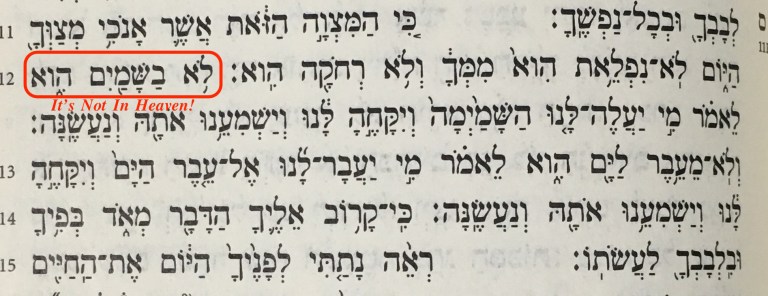 “For this commandment that I command you today is not too hard for you, neither is it far off. It is not in heaven, that you should say, ‘Who will ascend to heaven for us and bring it to us, that we may hear it and do it?’ Neither is it beyond the sea, that you should say, ‘Who will go over the sea for us and bring it to us, that we may hear it and do it?’ But the word is very near you. It is in your mouth and in your heart, so that you can do it.” (Deuteronomy 30:11–14 ESV)
“For this commandment that I command you today is not too hard for you, neither is it far off. It is not in heaven, that you should say, ‘Who will ascend to heaven for us and bring it to us, that we may hear it and do it?’ Neither is it beyond the sea, that you should say, ‘Who will go over the sea for us and bring it to us, that we may hear it and do it?’ But the word is very near you. It is in your mouth and in your heart, so that you can do it.” (Deuteronomy 30:11–14 ESV)
A simple reading of this text is not difficult to understand. Moses is telling the people of Israel that the commandments are not too difficult. Further making it clear that one need not wait for someone to ascend into heaven, or travel beyond the sea in order to bring them to the people. Very plainly, the word is very near, in their mouth and in their heart so that they can do it.
Judaism and Christianity obviously know this passage. In fact, in this episode, Ross suggests that both took the plain meaning of this passage and arrived at far reaching interpretations. Working through a story known as the oven of Akhnai contained in the Babylonian Talmud (Baba Metzia 59b), and Paul’s interpretation of these words contained in Romans 10:5-10, he shows how the word declared near can easily be missed.
Should possession of the written Torah allow one to ignore the voice of God? Would God rejoice if His children ignored His voice? Should the majority rule in a decision so long as no harm was intended? Is it acceptable to take a passage out of context and add to the words, providing an interpretation that at best stretches the intended meaning?
Perhaps the Bible means what it says.
Podcast: Play in new window | Download
Subscribe: RSS

